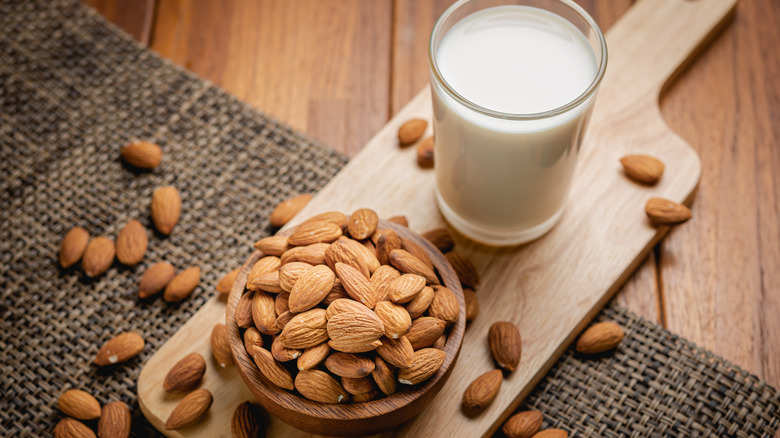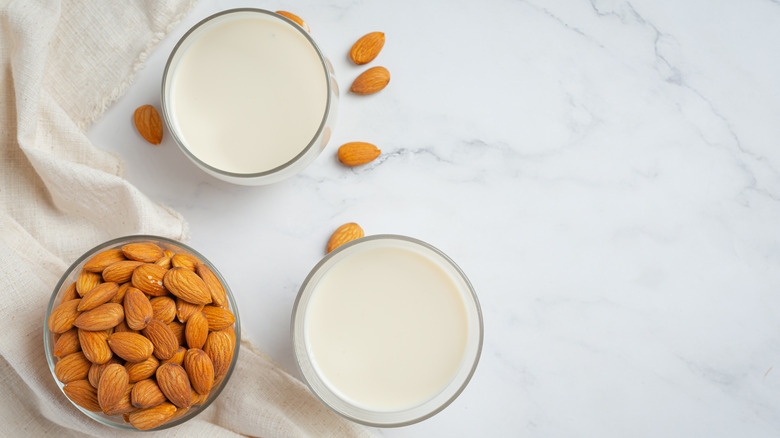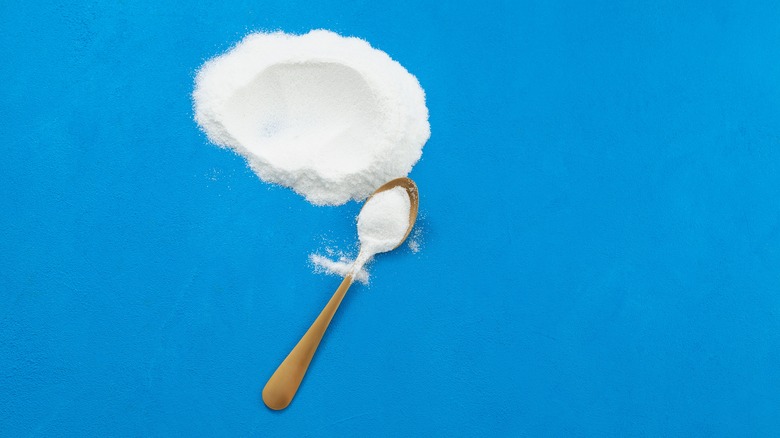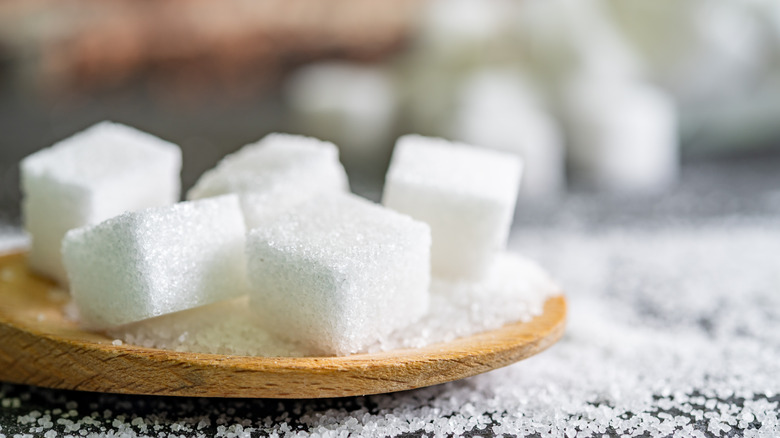11 Reasons You May Want To Avoid Drinking Almond Milk
The plant-based revolution is in full swing, and of all of the products on the market replacing animal-based foods, few are as in demand as milk substitutes. Plant-based milk alternatives show no sign of slowing down in popularity, and there are a lot of types out there — from soy and oat milk, to hazelnut, hemp, and even quinoa-based milk alternatives. And amongst all these products, one type of milk alternative stands tall: almond milk. Almond milk is the most popular of all the plant-based milk substitutes out there, with $344 million of the product sold in just the first three months of 2021 alone, according to Statista. And we can see why. With a taste that's close to cow's milk without any of the dairy, almond milk is a viable, versatile, and widely available product.
But is almond milk really as good as they say? While "plant-based" is arguably used to suggest ideas of wellness and nutritional value, there are certain things about almond milk that might make you think twice about picking up a carton in the store. Whether due to its nutritional profile, or certain things that are added to almond milk, things may not be exactly as they seem –- and we've got the lowdown right here.
You'll be missing out on calcium
If you have fond memories of being given a daily glass of milk by your parents as a kid, you'll also potentially remember one of the reasons they gave you for doing so: "You need your calcium." But, unfortunately, drinking a cup of almond milk may not deliver you the same hit of the nutrient. While cow's milk is naturally abundant in calcium, with one cup delivering approximately 300mg (per UCSF Health), almond milk doesn't have the same amount, as The Daily Meal notes. Although whole almonds do have good calcium levels, the production process to make almond milk causes a significant loss in it.
There is a caveat to this, though, which is that fortified almond milk brands may have calcium added back into them, meaning that you can get a good amount from certain glasses (roughly 120mg per 100ml, according to BBC Good Food). Your body will certainly thank you for choosing the fortified versions. As registered dietician Trista Best explains, calcium is not only vital for keeping your bones strong and preventing brittleness, but it also plays a vital role in regulating your hormones and your emotions by keeping your neurotransmitters healthy (per Mashed). Looks like your parents were right to serve up that cold glass every morning!
Almond milk's protein content is low
Regular cow's milk is an excellent source of protein, and just 8 fluid ounces can deliver you 8 grams of the necessary nutrient, as Healthline explains. But if you're picking almond milk in hopes that it'll have a similar nutritional profile, you may be left disappointed. The same amount of almond milk will provide a pretty measly 2 grams of protein. Given that the rough amount you should be aiming for is 0.36 grams of protein per pound of body weight (per Healthline), if you weighed 180 pounds, a glass of almond milk would give you approximately 3% of your recommended intake. It's also important to bear in mind that protein isn't just for bodybuilders, with the nutrient involved in making sure every single cell is equipped to maintain our body and repair damaged tissue (per Piedmont).
It's worth pointing out that almond milk does have a better protein content than other milk alternatives out there, with milk substitutes like coconut milk and rice milk containing no protein at all. However, if you're looking for plant-based milk that still delivers a sizable protein content, you may want to pick up a carton of soy milk, which provides almost the same amount of protein as cow's milk.
Almond milk isn't great for the environment
There's no denying that the dairy industry isn't exactly kind to the environment, with cows bred for dairy making a significant contribution to the release of greenhouse gases, according to research published in Animal Frontiers. Therefore, it might be tempting to plant-based milk is more sustainable. But, the production of almond milk isn't as innocent as you might think. Although it's certainly true that farming almonds to make milk takes up less space than dairy-specific farming, this doesn't exactly translate to a smaller impact on the environment, with an astonishing amount of water (130 pints) going into making just one glass of almond milk, as The Guardian notes.
This production process doesn't just place a strain on natural resources, but also on other members of the larger ecosystem. Creating almond milk takes an enormous amount of bees to pollinate the almond plant, but these bees then die in astonishingly large numbers due to their increased workload. And given that we need bees and their pollinating abilities to continue maintaining the natural balance of biodiversity, and therefore life (per the UN Environment Programme), this isn't exactly great news.
It may not be the best choice for your coffee
It's easy to assume that in this day and age, plant-based milk alternatives are made to use in any scenario that requires milk –- including your morning hot drink. But coffee lovers might want to think twice before stocking up on almond milk. Unfortunately, not all almond milks are well-engineered for use in coffee and can split when coming into contact with the heated liquid, as Mashed states. Almond milk is also less easy to use than regular milk in commercial settings. Unless it's barista-style almond milk, it may not have the same foaming capabilities, leading to a pretty disappointing cappuccino.
So, if you're primarily buying your almond milk for use in drinks, you might be better off looking elsewhere. For lovers of a more indulgent, creamier coffee, coconut or cashew cream can be excellent substitutes for half and half. Both creams have a silky-smooth and stable composition that will keep from splitting, although it's worth bearing in mind that coconut cream may impart a coconut flavor, as Tasting Table says. For a slightly lighter milk alternative that still works well with coffee, oat milk is probably your best bet. It's also a great choice to go for in coffee shops, thanks to its neutral flavor and ability to steam up well, explains Mashed.
Almond milk can contain carrageenan
While we might want our almond milk to be nothing but almonds and water, the truth is that's often not what's actually in the carton. Almond milk can often contain a surprisingly large amount of additives, as Healthline explains, and carrageenan is one of them you need to watch out for. Typically added into almond milk to give it a creamy consistency and increased thickness, carrageenan is derived from seaweed, states Mashed. And although the natural origin of the additive might cause you to assume that it's harmless, carrageenan may be a little more problematic than you think. The thickening agent has been associated with causing increased inflammation, which may then contribute to a range of chronic conditions like arthritis or inflammatory bowel disease, says Healthline. Additionally, carrageenan may be particularly irritating for people with certain pre-existing conditions like IBS.
While carrageenan is still approved for human consumption by the FDA, it may still be an ingredient you want to avoid. Bear in mind, too, that almond milk can often contain other thickening agents like gums and emulsifiers, and may also have certain flavorings added into it, as well as additional salt and sugar. Always make sure to check the label before you buy your almond milk.
If you have allergies, it's best to avoid almond milk
Over one in 10 adults have food allergies in the U.S., according to the Asthma and Allergy Foundation of America, and those individuals that do know how important it is to adapt their diet accordingly. For some folks, this may include leaving almond milk off the menu entirely. People who have a tree nut allergy that includes a strong allergic reaction to almonds may be triggered by drinking the milk, as the production process for the liquid may not be strong enough to destroy the response-provoking proteins. As a result, people that drink almond milk who have an almond allergy may experience symptoms like diarrhea, vomiting, wheezing, hives, or abdominal pain (per Healthline).
This isn't the case with everyone, though. As Allergy Resources explains, certain people might be able to tolerate almond milk even if they have an allergy to whole almonds, thanks to the specific type of protein they're allergic to. However, if you're in any doubt as to whether almond milk will be tolerable, it's highly recommended that you discuss it with your doctor before you try and drink any, particularly if you have a strong allergic response to eating almonds or other tree nuts.
It can be tricky to cook with
As any chef knows, milk isn't just for drinking. The liquid plays a vital role in a range of dishes, and surely almond milk can be used in the same way, right? Well, not quite. In fact, while it is entirely possible to cook with almond milk, it has its own set of rules, one of the main ones being that boiling it is a serious no-no, according to Tasting Table. When you heat almond milk to too high a temperature, it tends to become bitter and can ruin the taste of your meal. It's best, therefore, to try and add the milk towards the end of the cooking process if using it in stews or soups, or use it in dishes that don't require cooking, like overnight oats.
And as well as bitterness, you may need to watch out for sweetness. Certain types of almond milk can have a fairly significant amount of added sugar, so throwing it into a dish can make your food much sweeter than you anticipated. It's for this reason that unsweetened almond milk might be the best option for using in your meals. Alternatively, just make sure you account for the sweetness that almond milk can add by reducing sugar elsewhere.
Almond milk may be low in fiber and antioxidants
Almonds are nutritional powerhouses. As well as containing a great protein and mineral content, they're also abundant in fiber and contain an enviable amount of vitamin E, a powerful antioxidant that may help to fight free radical damage in the body (via Almond Board of California). But if you're assuming that almond milk will pack the same nutritional punch, you may be mistaken. These nutrients primarily exist inside the nut itself, and when the milk is made, much of this nut content doesn't make it into the bottle, as Medical News Today explains. This means that the majority of the antioxidants and fiber are stripped away.
As a result, a cup serving of almond milk will only provide you with approximately 0.5 grams of fiber, according to the USDA. Luckily, the vitamin E content fares slightly better, and you may still be able to get around a fifth of your daily requirement from a 3.5-ounce serving (per Healthline). If your almond milk brand is fortified, too, you may get even more vitamin E, as well as vitamins A and D from the liquid.
Sweetened almond milk can be super high in sugar
Almond milk has a gentle, slightly nutty taste, and certain brands seek to amp this flavor up by adding sugar to their drink. But sometimes, the amount of sugar can be pretty surprising. In some cases, each cup of almond milk you consume can have roughly 13 grams of added sugar, according to The Daily Meal. This may particularly be the case if your almond milk is flavored, too. This sugar amount is over half of the daily allowance for added sugar recommended by the American Heart Association for women, and over a third of the amount recommended for men, according to the Harvard T. H. Chan School of Public Health.
It's worth bearing in mind that a lot of different types of milk contain sugar, too, including normal cow's milk –- but if you're looking to keep your sugar content on the lower side, it might be worth picking up some unsweetened almond milk instead. As you might expect, the amount of sugar you get in unsweetened almond milk is much lower, with under a gram of sugar per serving, as WebMD points out.
You should never feed almond milk to infants
If you've started on a plant-based milk journey, it might seem like a lot of hassle to continue to buy cow's milk for your little ones. And surely it'll be fine to just feed them the almond milk that you're drinking too, right? Wrong. Almond milk is a pretty poor choice nutritionally for infants and is best left out of their bottle entirely, according to Healthline. Almond milk loses a lot of its nutritional value when the almonds are processed into a drink. As a result, the remaining liquid is fairly devoid of a lot of the nutrients infants need to grow healthily, like calories, protein, fats, and essential vitamins and minerals.
At an especially young age (under one-year-old), feeding your baby almond milk may also get in the way of their iron absorption processes, which may then create issues around growth and development. It's best to feed your baby formula or breast milk before they turn one, and after that, to stick to cow's milk, which has ample nutrients needed for growth. It may also be worth consulting your doctor or pediatrician about whether there are any non-dairy formula alternatives that you could give to your child.










